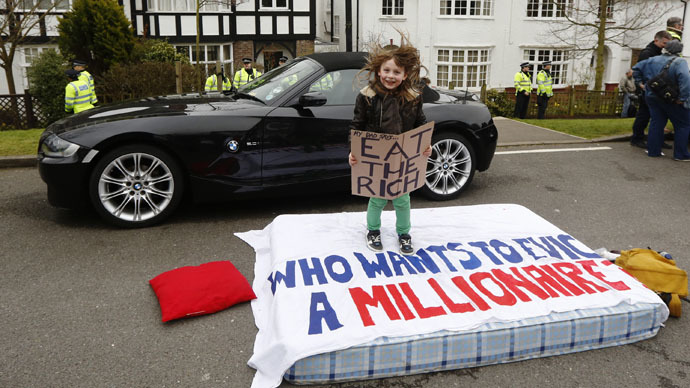For richer, for poorer: Top earners surpass pre-crash wealth, low income youth worse off

Britain’s richest people are now better off than before the financial crisis, having seen their wealth grow 64 percent, according to a new report. Low income groups meanwhile have seen their share plummet, prompting warnings of “extreme inequality.”
Homeowners also saw their fortunes improve, while the UK’s top 20 percent of earners are far wealthier than they were before the financial crisis of 2007-2008.
The lowest 20 percent income group and those aged 26 to 35 saw their wealth drop considerably, with the average person having just six days’ worth of income in savings.
The Social Market Foundation (SMF) found these groups are most vulnerable to a future economic downturn.
Britain’s wealthiest 20 percent are “far more financially secure today than those in the top incomes going in the downturn,” according to the SMF.
Median financial wealth for the top income group increased 64 percent between 2005 and 2012/13.
READ MORE: 14mn Britons will be living in poverty by 2030 – report
“They are now less likely to be in debt compared to the middle-income group – a reversal of the pre-crisis trend,” the report said.
“The proportion of individuals with non-mortgage debt in this group fell from 43 percent in 2005 to 31 percent in 2012/13.”
Homeowners have also fared well over the past 10 years, having seen an average increase in savings.
People who paid off their mortgages between 2005 and 2012 saw a gain of £2,500, in addition to any increase in property value.
The losers of the past decade are 26 to 35 year olds and the lowest 20 percent income group, according to SMF.
“Wages for younger workers fell substantially during the downturn – at a greater rate than the average.
The report adds: “[Twenty-six] to 35 year olds today are less likely to own a home. In 2005, 74 percent of 26 to 35 year olds owned a home; by 2012-13, this had dropped to 54 percent.”
RT @StrongerInNos: Drop in disposable income for everyone apart from ... pic.twitter.com/PrLYkkG5ws Only richest 20% better off
— The Equality Trust (@equalitytrust) June 26, 2014
On average, young people have less than one week’s worth of income in savings.
The percentage of young debt-holders has also increased by 45 percent, the bulk of which is tied up in overdrafts, credit card debt and loans.
Britain’s lowest income group is much worse off now than before the financial crisis, with the median financial wealth dropping 57 percent since 2005.
At the same time, the bottom 20 percent income bracket has seen their personal debt rise 67 percent in value, largely as a result of overdraft usage.
READ MORE: ‘Everyone for themselves’: Church of England attacks Cameron govt for ‘evil’ inequality
Duncan Exley, director of The Equality Trust, said the report’s findings were a “damning” indictment.
Speaking to RT, he said: “It's a pretty damning account of where this country is at present. An increasing number of people at the bottom are struggling to put a roof over their heads, let alone save for a rainy day. But those at the top continue to see their coffers swell.”
Exley said it was impossible to build a sustainable country on such “extreme inequality.”
“The UK is now one of the developed world's most unequal countries, and we know this inequality means we have worse physical and mental health and more violent crime as a result.”
“We need politicians to do more than talk tough on economic inequality, we need them to introduce policies that actually lead to its reduction, like a reform of council tax or a return to the 50 [percent] top income tax rate,” he added.
In its report, the SMF found British households were poorly prepared for the financial crisis as a result of indebtedness.
With the OBR predicting household debt to return to its pre-crisis peak in 2018, the organization warns the most vulnerable in society would be ill-prepared for a second financial crash.












